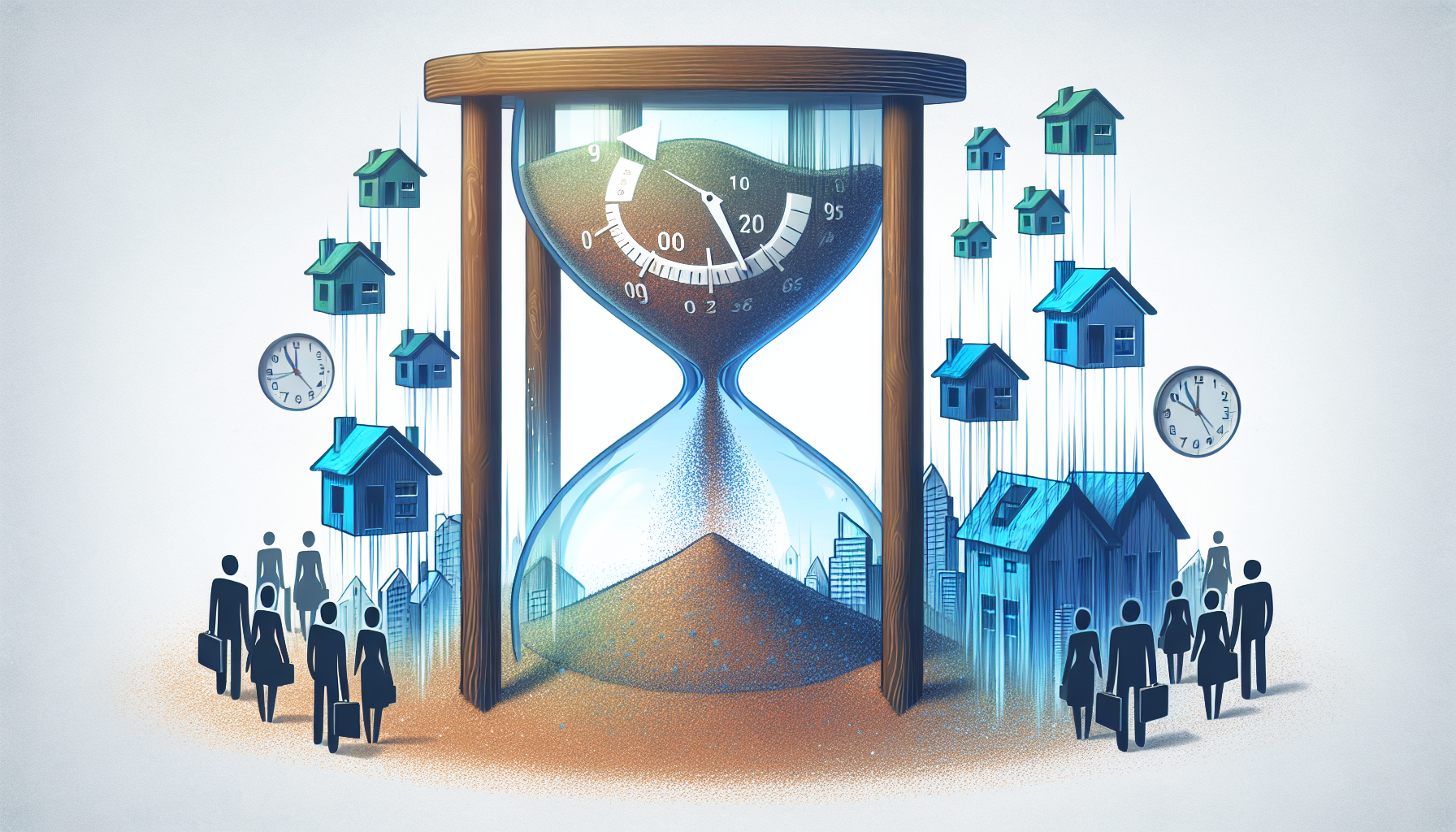As we approach the new year, one question looms large for many: what does the future hold for housing market 2024 trends? Whether you’re a home buyer, a seller, or simply someone with a keen interest in real estate trends, understanding the upcoming shifts in the housing market is crucial. This blog post will delve into the anticipated trends, examining key factors such as home prices, interest rates, and inventory levels. So, sit back, and get ready for a deep dive into the future of the housing market 2024.
Key Takeaways
The 2024 housing market is shaped by home prices, interest rates, and inventory levels, with a forecasted increase in home sales, potentially favoring sellers due to high demand and stable or increasing home prices.
Interest rate fluctuations will impact mortgage affordability and buyer demand, with the possibility of moderating later in the year. New construction is seen as a significant contributor to inventory levels, potentially affecting buyer options and pricing.
Technological advancements, such as smart home technologies, AI, and predictive analytics, are expected to revolutionize efficiency, convenience, and transparency in the real estate market, while financial planning for homeownership becomes crucial due to market volatility.
Evaluating the Housing Market Landscape in 2024

The 2024 housing market landscape promises to be a complex one, shaped by a multitude of interconnected factors. Home prices, interest rates, and inventory levels will play significant roles in shaping overall market conditions. The National Association of Realtors forecasts a potential 15 percent increase in home sales, suggesting a market favoring sellers due to high demand and stable, or possibly increasing, home prices.
However, a shift towards a buyer’s market is plausible if:
There is an increase in inventory
There is moderation in rates
Demographic influences, such as Millennials entering their peak home-buying years, coupled with socioeconomic factors like wage growth, will also be vital in supporting housing demand.
The Pulse of Home Prices

Home prices in 2024 are anticipated to appreciate modestly. Here are the possible scenarios:
Low- to mid-single digit pace growth is anticipated in most regions of the country.
There is a possibility of a 5% decrease in median home prices.
If rising mortgage rates decrease more rapidly than expected, home prices may remain relatively stable throughout the year.
The stability of home prices depends heavily on real incomes. If real incomes increase at a faster rate than inflation, an increase in purchasing power combined with lower mortgage rates could enhance affordability, drive up home sales, and lead to higher prices. Home price appreciation is anticipated if real incomes experience growth between 2025 and 2027, with home prices likely increasing by about 1% to 2% above the current inflation rate. This suggests a potential correlation between real income growth and rising home prices during this period.
Interest Rates Outlook

Fluctuations in interest rates throughout 2024 will affect mortgage affordability and buyer demand. These fluctuations could potentially create some moderation later in the year. Changes in mortgage rates can either increase or decrease the interest of potential homebuyers, thus significantly impacting buyer demand.
In order for the housing market to return to 2014-2019 levels of activity, the following housing market predictions are projected:
Mortgage rates between the upper 4% to lower 5%
A rapid decrease in interest rates
An unexpected increase in buyer demand
Depletion in inventory
Rebound in home prices.
Inventory Flux: Low Supply vs. High Demand
Various factors will shape the inventory levels in 2024. These factors include:
Underbuilding, which has led to a scant 3.6-month supply at the current sales pace of existing homes
Many homeowners being locked in at low interest rates or being unwilling to sell
Rising interest rates, which could lead to more deals falling through, increasing inventory, and potentially pushing prices down.
On the other hand, the main sources of housing inventory are existing home sales and new construction. With around 80% of homeowners having considerable equity in their property, there may be more listings on the market. Despite a slight increase in new building permits, inventory is expected to rise from the current low levels but is not likely to see a substantial increase in 2024.
Predicting the Shifts: Buyer’s or Seller’s Market?

Understanding potential power shifts will be essential for navigating the 2024 housing market. Currently, the market favors sellers, given that demand is likely to exceed supply. This ongoing seller’s market seems unlikely to change without a significant increase in inventory.
However, the tide could turn. The trend of skyrocketing home prices is expected to shift due to high mortgage rates leading to a more balanced market. By 2025, the housing market could significantly favor home buyers.
Navigating a Seller’s Market
Strategic pricing and effective marketing will be keys to navigate the seller’s market in 2024. To maximize profits, sellers can employ various strategies, including:
Setting a competitive list price based on market conditions and comparable sales
Considering different pricing approaches such as strategically low or precise pricing
Focusing on realistic, competitive pricing to attract serious buyers while avoiding pricing gimmicks.
In terms of marketing, sellers can:
Create a strong online presence through a dedicated website and blog to showcase the home and attract potential buyers
Partner with local businesses to help increase exposure and reach a larger audience
Prepare and stage the home to enhance its value and appeal
These strategies can help sellers effectively market their home.
Opportunities in a Buyer’s Market
Despite the unlikelihood of a shift towards a buyer’s market in the near future, opportunities can still be found amidst the challenges. Some strategies for would be buyers to consider include:
Being financially prepared
Staying informed about local market trends
Actively searching for opportunities By following these strategies, buyers can position themselves to take advantage of any potential opportunities that arise.
To capitalize on these opportunities, buyers should focus on financial preparation, understanding local market trends, and being ready to act when opportunities arise. Financial readiness can be achieved by saving money and paying down debt to improve credit scores, researching and comparing mortgage lenders to find the best deal, and considering waiting until the latter part of the year when homes may be more affordable. Understanding local market trends can be achieved by conducting research using online sources such as real estate websites, news articles, and market analysis reports.
Mortgage Rate Movements and Their Impact on the Market
Both first-time buyers and existing homeowners will feel the impact of mortgage rate movements on the 2024 housing market. The projected mortgage rates for 2024 indicate a sustained increase since approximately doubling in 2022, attributed to the Federal Reserve’s measures to address inflation.
This trend of mortgage interest rates has shown a consistent upward movement since the conclusion of 2021.
The Effect on First-Time Buyers

Higher mortgage rates can pose challenges for first-time buyers, reducing the affordability of homes. This may limit their ability to purchase and potentially make it harder to qualify for a loan. Additionally, rising interest rates can result in heightened competition among buyers, leading to increased home prices and a more competitive market.
However, first-time buyers can still find opportunities by focusing on financial readiness. Real estate experts recommend purchasing now before the interest rate decreases, while others advise approaching the decision to buy now or later as a mathematical problem, likely comparing the cost of waiting with the potential for rates to rise further.
Strategies for Existing Homeowners
Existing homeowners can strategize by refinancing when rates drop or leveraging home equity for financial goals. Refinancing offers potential benefits to homeowners by potentially lowering monthly mortgage payments, providing access to equity for other investments or expenses, and securing better loan terms to navigate through a declining market.
Homeowners can also leverage home equity for financial goals in 2024 by considering strategies such as refinancing, paying off debt, home renovations, investing in education or career development, and creating an emergency fund. However, some potential risks of leveraging home equity for financial purposes include the possibility of foreclosure if the loan is defaulted, the loss of tax deductions on interest payments unless the funds are used for home renovations, potential damage to the credit score, and the risk of overextending oneself financially.
The Forecast for Housing Market Crashes and Recessions
Despite the low likelihood of a housing market crash or recession in 2024, it remains important to monitor economic indicators and prepare for possible price declines. Factors such as robust demand from millennials and low supply levels contribute to the low likelihood of a housing market crash or recession.
Most economists anticipate sluggish growth rather than a severe downturn, reducing the likelihood of a housing market crash or recession.
Economic Indicators to Watch
Economic indicators provide valuable insights into the health of the housing market. Some key indicators to consider are:
GDP growth: When the economy is expanding, individuals typically have higher income and confidence, which can result in heightened demand for housing.
Unemployment rate: High unemployment rates can lead to decreased demand for housing, as individuals may have reduced disposable income and are more hesitant about significant purchases such as homes.
Interest rates: Lower interest rates can make borrowing more affordable, which can stimulate housing market activity.
Consumer confidence: Positive consumer sentiment can lead to increased demand for housing, while negative sentiment can have the opposite effect.
By monitoring these indicators, you can gain a better understanding of the current state of the housing market and make informed decisions.
Other indicators such as unemployment rates and inflation also significantly impact the housing market. High unemployment rates can lead to lower expected future income, reducing the demand for housing, and resulting in potential decreases in home prices. Inflation impacts the housing market by increasing housing prices, affecting affordability, and influencing mortgage interest rates.
Preparing for Potential Price Declines
Preparing for potential price declines involves maintaining financial stability and being ready to adapt to changing market conditions. Real estate investors should prioritize implementing strategies such as portfolio diversification and market analysis to mitigate the risks of potential price declines.
Homeowners, on the other hand, can prepare for potential price declines by refinancing when rates drop. Refinancing offers potential benefits to homeowners, including:
Potentially lowering monthly mortgage payments
Providing access to equity for other investments or expenses
Securing better loan terms to navigate through a declining market.
The Role of New Construction in Shaping 2024’s Housing Market
The shaping of the 2024 housing market will heavily rely on new construction, which will influence inventory levels and buyer demand. The increase in new construction is expected to contribute to a higher overall supply of homes available for sale, potentially addressing the low inventory levels that have posed a challenge in recent years.
Home Builders’ Response to Market Needs
Home builders are addressing market challenges by:
Boosting construction activity
Streamlining the construction process
Reducing construction time
Exploring innovative solutions like modular and prefabricated construction methods
These strategies are influenced by factors such as positive industry growth, low interest rates, and demographic demands that are prompting builders to expand their activities.
The primary market needs driving new home construction include:
Job growth
Homeowner improvement and maintenance spending
Home prices
Forecasted increases in existing home sales
Broader industry trends in renovations and sustainability
These factors collectively contribute to the push for increased construction activity.
The Effect on Total Housing Inventory
The impact of new construction on total housing inventory is significant. As builders ramp up construction, new homes account for a larger share of the housing inventory. This increase is crucial in times of low inventory, as it helps meet the burgeoning demand from buyers.
On the other hand, an increase in housing inventory, particularly from new construction, offers buyers a wider range of options to match their specific needs and preferences. Additionally, the greater supply of homes can lead to competitive pricing, as sellers may need to adjust prices to attract buyers from the expanded pool of options.
Advancing Your Real Estate Goals in 2024

A keen understanding of market trends and tailored strategies will be required to navigate the 2024 housing market, regardless if you are a first-time home buyer or a seasoned homeowner planning to sell. The real estate landscape of 2024 will be shaped by key factors such as home prices, interest rates, and inventory levels, and understanding these trends will be crucial to advancing your real estate goals.
For Prospective Home Buyers
Prospective home buyers should focus on the following:
Financial preparation: Save money and pay down debt to improve credit scores. Research and compare mortgage lenders to find the best deal.
Understanding local market trends: Stay informed about the housing market in your area. Look for trends in home prices, inventory, and interest rates.
Being ready to act: Be prepared to make an offer when you find the right home. Consider waiting until the latter part of the year when homes may be more affordable.
By following these steps, you can increase your chances of finding and purchasing your dream home.
Understanding local market trends can be achieved by conducting research using online sources such as real estate websites, news articles, and market analysis reports. Taking steps to prepare for potential opportunities in the housing market involves organizing finances, exploring affordable mortgage options and homebuyer programs, staying informed about market trends to act promptly when a favorable opportunity arises, and carefully selecting a real estate agent that meets specific requirements.
For Home Sellers
For home sellers, the key to success lies in effective marketing and strategic pricing. Here are some recommended marketing strategies for home sellers in 2024:
Creating engaging short videos
Leveraging social media platforms
Growing a community through newsletters
Utilizing QR codes for easy information sharing
Producing searchable YouTube videos
Implementing marketing automation tools
Customizing marketing plans to the property
Consistently providing fresh content
These strategies can help you effectively market your home and attract potential buyers.
On the pricing front, here are some strategies to refine your pricing strategy:
Thorough research on the local housing market
Use of Automated Valuation Models (AVMs) for accurate price estimates
Setting an attractive yet competitive listing price
Seeking advice from real estate professionals
Additionally, understanding buyer preferences for home features can further aid in selling the property quickly and at a good price.
The Intersection of Technology and Real Estate Predictions
In 2024, real estate predictions and trends will be significantly shaped by technology. Some of the key technologies that are anticipated to revolutionize the industry include:
Smart home technologies
Sustainable building practices
Artificial intelligence (AI)
Virtual reality (VR)
Augmented reality (AR)
Blockchain for property transactions
These emerging technologies are expected to improve efficiency, convenience, and transparency in real estate transactions.
Tech-Driven Home Sales
Tech-driven home sales are reshaping the real estate landscape, offering increased access to information for buyers and renters, changing real estate marketing dynamics, and leading to higher selling prices for smart technology-equipped properties. Technologies such as:
remote property viewings via online listings and virtual tours
electronic contracts and signatures
comprehensive information via websites and apps
automation of repetitive tasks
are streamlining transactions and making the entire process more efficient for all parties involved.
However, these tech-driven home sales also come with potential drawbacks, including:
possible high transaction fees
limited availability
less personal interactions
overdependence on technology
the potential to disrupt traditional real estate practices.
Predictive Analytics in Pricing
Predictive analytics plays a pivotal role in determining real estate pricing by analyzing historical sales data, current market trends, and forecasting future market behavior. This allows agents and brokers to determine the optimal listing price for a property and make informed decisions when buying or selling real estate.
AI algorithms and predictive analytics are enhancing the precision of real estate forecasts by analyzing extensive data on comparable properties and market trends. This results in more precise predictions about property values, pricing, and market trends. Furthermore, AI can utilize predictive analytics to examine historical data, offering valuable insights into upcoming real estate developments.
Financial Planning for Homeownership in 2024
Given the anticipated fluctuations in the housing market, financial planning for homeownership in 2024 will be of utmost importance. Prospective homeowners should prioritize their financial stability and preparedness, which involves meticulous budgeting and thoughtful consideration of housing affordability, ensuring they can comfortably manage their monthly housing payments.
Budgeting for Rising Costs

Budgeting for potential increases in interest rates, home prices, and other costs associated with homeownership, including the down payment, is essential for prospective homeowners. Increases in interest rates can impact monthly mortgage payments by increasing the cost of borrowing, leading to a higher interest portion of the mortgage payment.
To mitigate these risks, prospective homeowners can:
Monitor interest rate trends
Assess interest rate risk
Adjust their budget to account for higher interest payments
Pay down debt to reduce impact
Maintain a reserve fund
Review asset allocation to align with changing interest rate conditions.
The projected increase in home prices for 2024 is expected to be around 3 to 4 percent.
Building Equity in a Volatile Market
Building equity in a volatile market in 2024 will require a long-term perspective, focusing on consistent mortgage payments and strategic home improvements. A volatile housing market can affect the progress of building equity in several ways. Fluctuating prices can make it challenging to accurately estimate the value of a property, impacting the equity calculation.
However, homeowners can still build equity by making consistent mortgage payments. Strategic home improvements that can have a significant impact on home equity include:
Basement renovation
Garage addition or renovation
Attic conversion
HVAC conversion or electrification
Garage door replacement
Manufactured stone installation
Summary
In closing, the 2024 housing market will be shaped by a multitude of factors, from home prices and interest rates to inventory levels and new construction. Technology will also play a significant role in shaping real estate predictions and trends. Both buyers and sellers will need to adapt their strategies to navigate this evolving landscape and achieve their real estate goals. By staying informed and prepared, prospective homeowners can navigate the housing market with confidence and success.
Frequently Asked Questions

Will mortgage rates drop in 2024?
Mortgage rates are expected to drop to around 6% in 2024, according to experts.
Will 2024 be a better year to buy a house?
2024 is expected to be a good year to buy a house, with predicted easing of home prices, lower mortgage rates, and improved affordability, making it a favorable time for potential homebuyers.
Will mortgage rates go down in 2025?
Fannie Mae anticipates a gradual decline in mortgage rates over the next two years, with a projected rate of 6.9% for the 30-year mortgage by 2025. This could potentially trigger a modest rebound in home sales.
What are the anticipated trends for home sales in 2024?
The anticipated trend for home sales in 2024 is a potential 15 percent increase, favoring sellers due to high demand and stable or slightly increasing home prices.
What impact does new construction have on shaping buyer demand?
New construction significantly shapes buyer demand by providing new housing options and customization possibilities.

Leave a Reply